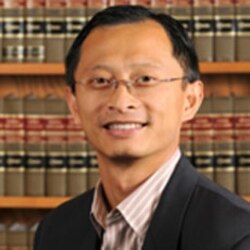Or download MP3 (Right-click or option-click and save link)
AA: I'm Avi Arditti with Rosanne Skirble, and this week on WORDMASTER: The First Amendment to the U.S. Constitution is more than two centuries old. Americans still talk about it a lot, but what exactly is it?
RS: We asked American University law professor Robert Tsai, author of the book "Eloquence and Reason: Creating a First Amendment Culture."
ROBERT TSAI: "It's one of the amendments in the original Bill of Rights that we know the most about. It seems that the colonists were most exercised, you might say, about questions of freedom of expression or speech, as they talked about it; of conscience and worship; and of the right to assemble and petition their government for right of redress. We hear about that part of it less often today."
AA: "I mean it's forty-five words long. I actually printed out a copy of it here and -- "
ROBERT TSAI: "You counted."
AA: "Yeah, well, it looks like I think I've got my math right here. It says, 'Congress shall make no law respecting an establishment of religion, or prohibiting the free exercise thereof; or abridging the freedom of speech, or of the press; or the right of the people peaceably to assemble, and to petition the Government for a redress of grievances.' That's a lot."
ROBERT TSAI: "Indeed, it's quite a mouthful. I'm glad you brought that up. And, you know, it's almost as though somebody tried to squeeze everything that was on the top of their minds that they found important that day, into a single phrase."
RS: "Avi just read to us the First Amendment. Now, those words don't change, but new meanings come into it. How has how we talk about the First Amendment changed?"
ROBERT TSAI: "Here is one example I use in the book. In about the, I guess, immediate post-World War Two period, you have judges on the Supreme Court talking about 'the wall of separation between church and state.' It's really a metaphor. It's a boundary metaphor that suggests, at least how it was used initially, that we're better off if there is a kind of fence making good neighbors between people who believe in one kind of god and those who believe in another kind of god, or those who believe in no kind of god at all.
"Over time, some of the connotations associated with 'the wall of separation between church and state' begin to change. And this change is in part because of what's going on outside of the courts. For example, you have Ronald Reagan who becomes elected, and he among other prominent politicians start to talk about the 'wall of separation' as something that is oppressive.
"So in terms of what judges do, this is quite interesting. One thing that judges do is, judges stop using the metaphor. It starts to acquire enough negative connotations that you don't see a majority of the court favoring that way of talking about our religious liberties."
AA: "Well, you know, it's been interesting to just, I was thinking of some recent cases where the First Amendment has somehow been invoked or people talk about it in the context of these. For example, the big Supreme Court ruling in January, the 'Citizens United' case upholding the right of corporations and unions to sort of spend unlimited amounts on independent campaign ads to get someone elected or to oppose someone. The mosque in New York -- "
ROBERT TSAI: "Right."
AA: " -- that's proposed near Ground Zero. Even the WikiLeaks, the release of all the confidential documents. You've got some newspapers, the New York Times, publishing them, too, and I guess defending that right under the First Amendment. Can you think of others? This seems like this is, you know, still very much a part of our everyday life."
ROBERT TSAI: "Yeah, and you mentioned the WikiLeaks case, right? I mean, so -- were there ever old days? But let's assume there were some old days, and in the old days the government or someone who wanted to stop speech that they believed they had a legitimate reason to interdict, could run to court and get an injunction, a legal order, that said 'So-and-so cannot disseminate X.'
"Is such a remedy really available or efficacious today, right? So even if the government could get an order that said 'So-and-so can't publish certain leaked information,' it comes down off the website and it pops up someplace else moments later or in multiple locations.
"There's an upside to this, if you believe in open government and are against government secrecy. But it certainly changes how we even think about the enforcement of law."
RS: Robert Tsai is a professor at the American University Washington College of Law and author of "Eloquence and Reason: Creating a First Amendment Culture." And that's WORDMASTER for this week.
AA: You can learn more about free speech issues at voanews.com/wordmaster. With Rosanne Skirble, I'm Avi Arditti.



